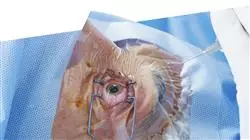University certificate
The world's largest faculty of medicine”
Why study at TECH?
A Postgraduate diploma that will allow you to update in 6 months in the laser techniques used in Refractive Surgery”

The introduction of advances in laser technology, new types of intraocular lenses and more precise surgical techniques have given Refractive Surgery a major boost. Thus, many patients with Myopia, Astigmatism or Hypermetromia have benefited from it, and other more complex clinical cases such as Glaucoma have also improved in recent years.
These relevant achievements for people's visual health, as well as the new surgical and medical treatments in Refractive Surgery are brought together in this 6-month Postgraduate diploma with the most advanced syllabus in the current academic panorama.
It is a program that is made up of an excellent team of ophthalmologist specialists with accumulated surgical experience and the implementation of the most precise procedures. In this way, students will be able to be aware at the end of this degree of the advances in Crystalline Refractive Surgery, Corneal Refractive Surgery, phakic lenses and the approach to patients with Glaucoma through this surgery.
An academic tour that also includes a Virtual Library composed of multimedia didactic material, complementary readings and simulations of case studies that provide greater dynamism.
A unique opportunity for updating through a flexible academic option that students can access whenever and wherever they wish. All you need is an electronic device with an internet connection to view this program at any time of the day. Thus, the professional will have greater freedom to self-manage his or her studies and will be able to balance his or her daily activities with a quality degree.
Video clips and detailed videos bring great dynamism to the update on surgical techniques and intraocular lens selection”
This Postgraduate diploma in Surgical Procedures in Refractive Surgery contains the most complete and up-to-date scientific program on the market. The most important features include:
- The development of case studies presented by experts in Ophthalmology and Refractive Surgery
- The graphic, schematic, and practical contents with which they are created, provide scientific and practical information on the disciplines that are essential for professional practice
- Practical exercises where self-assessment can be used to improve learning
- Its special emphasis on innovative methodologies
- Theoretical lessons, questions to the expert, debate forums on controversial topics, and individual reflection assignments
- Content that is accessible from any fixed or portable device with an Internet connection
Do you want to learn more about phakic lens advances at any time of the day and without time pressure? Do it with this 100% online program”
The program’s teaching staff includes professionals from sector who contribute their work experience to this educational program, as well as renowned specialists from leading societies and prestigious universities.
Its multimedia content, developed with the latest educational technology, will provide the professional with situated and contextual learning, i.e., a simulated environment that will provide an immersive education programmed to learn in real situations.
The design of this program focuses on Problem-Based Learning, by means of which the professional must try to solve the different professional practice situations that are presented throughout the academic course. This will be done with the help of an innovative system of interactive videos made by renowned experts.
It delves into the important achievements made through the laser-assisted phacoemulsification technique"

You will be updated on the latest clinical evidence on the use of Refractive Surgery in Glaucoma patients"
Syllabus
The syllabus of this university degree has been designed with the objective of offering ophthalmologist specialists the most advanced syllabus on Surgical Procedures in Refractive Surgery. To achieve this goal, the specialized teaching team has developed a content that brings students closer to the diagnostic and procedural advances in Corneal Refractive Surgery, on the crystalline lens, with phakic lenses and in patients with Glaucoma. A unique opportunity to be updated by the best experts and with innovative didactic material.

Thanks to this academic option you will be able to be aware of the most effective procedures to treat the complications derived from Refractive Surgery in patients with Glaucoma”
Module 1. Corneal Refractive Surgery
1.1. Cornea
1.1.1. Anatomy
1.1.2. Physiology
1.1.3. Pathology
1.1.4. Corneal Healing
1.2. Laser surgical techniques
1.2.1. PRK
1.2.2. LASIK/LASEK
1.2.3. Femtolasik
1.2.4. Smile
1.3. Microkeratomes and femtosecond lasers
1.3.1. The Corneal flap
1.3.2. Nasal hinge microkeratomes
1.3.3. Upper hinge microkeratomes
1.3.4. Femtosecond laser
1.4. Post-Operative Care
1.4.1. Physical Activity
1.4.2. Hygiene standards
1.4.3. Treatment
1.4.4. Postoperative revisions
1.5. Laser surgery complications
1.5.1. Preoperative
1.5.2. Preoperative
1.5.3. Specific trans-operative procedures for laser use
1.5.4. Post-Operatives
1.6. Laser retouching
1.6.1. Preoperative evaluation and indications
1.6.2. Surgical Techniques
1.6.3. Risk
1.6.4. Postoperative Care
1.7. Laser after keratoplasty (QPP)
1.7.1. How and when
1.7.2. Surgical Technique
1.7.3. Results
1.7.4. Conclusions
1.8. Laser after surgery with phakic and pseudophakic lenses
1.8.1. PRK
1.8.2. Lasik
1.8.3. Triple procedure
1.8.4. Aphakia
1.9. Intrastromal rings
1.9.1. Patient selection
1.9.2. Surgical technique and mechanisms of action
1.9.3. Results
1.9.4. Complications
1.10. Other Surgical Techniques
1.10.1. Presbyopic Lasik
1.10.2. Thermal/conductive keratoplasty
1.10.3. PTK
1.10.4. Other techniques in disuse
Module 2. Refractive Lens Surgery
2.1. Anatomy of the lens
2.1.1. Histological/ adult lens anatomy
2.1.2. Capsule and epithelial cells of the crystalline lens
2.1.3. Lenticular mass
2.1.4. Ciliary muscles and zonula
2.2. Accommodation
2.2.1. Mechanisms
2.2.2. Schacar's theory
2.2.3. Hemlhotz theory
2.2.4. New Theories
2.3. Presbyopia
2.3.1. Aging of the crystalline lens
2.3.2. Ciliary muscle atrophy
2.3.3. Medical Treatment
2.3.4. Surgical Management
2.4. Surgical techniques for the correction of Presbyopia
2.4.1. Presbyopic lasik
2.4.2. Monovision with lasik
2.4.3. Cataract Surgery
2.4.4. Clear lens surgery
2.5. Patient selection and indication for surgery
2.5.1. Age of the Patient
2.5.2. Crystalline State
2.5.3. Ametropia and Presbyopia
2.5.4. Emmetropic patient and Presbyopia
2.6. Calculation of intraocular lenses: Biometrics
2.6.1. Formulas for calculation
2.6.2. Bio-Meters
2.6.3. Surveying and surveyors
2.6.4. Tear film status
2.7. Selecting the right lens
2.7.1. Diffractive lenses
2.7.2. Refractive lenses
2.7.3. Accommodative lenses and EDOF
2.7.4. Patient expectations and needs
2.8. Surgical technique of the crystalline lens
2.8.1. Anesthesia
2.8.2. Surgical preparation
2.8.3. Phacoemulsification
2.8.4. Femtosecond surgery
2.9. Surgical complications
2.9.1. Capsular rupture
2.9.2. Corneal edema
2.9.3. Endophthalmitis
2.9.4. Residual defect/refractive surprise
2.10. Complex and special cases
2.10.1. High Myopia
2.10.2. High Farsightedness
2.10.3. High Astigmatism
2.10.4. Uncooperative patients
Module 3. Phakic lens surgery
3.1. Phakic lenses
3.1.1. Concept
3.1.2. Type of phakic lenses
3.1.3. Current use of phakic lenses
3.1.4. Materials used in phakic lenses
3.2. Anatomical aspects in relation to the use of phakic lenses
3.2.1. Anatomy of the anterior pole of the eyeball
3.2.2. Biometric data to be taken into account for the implantation of phakic lenses
3.2.3. Measuring instruments used
3.2.4. Anatomical contraindications
3.3. Optical aspects of phakic lenses
3.3.1. Ocular optics
3.3.2. Phakic lens optics
3.3.3. Spherical correction with phakic lenses
3.3.4. Correction of Astigmatism with phakic lenses
3.4. Indications for phakic lens implantation
3.4.1. Indications in the adult eye
3.4.2. Indications in children
3.4.3. Indications in the pathological eye
3.4.4. Clinical contraindications
3.5. History of phakic lens development
3.5.1. The precursors
3.5.2. First models
3.5.3. Disused models
3.5.4. Development of current models
3.6. Angle-supported phakic lenses
3.6.1. Concept
3.6.2. Indications
3.6.3. Implantation Techniques
3.6.4. Complications
3.7. Iridian fixation phakic anterior chamber lenses
3.7.1. Concept
3.7.2. Indications
3.7.3. Implantation Technique
3.7.4. Complications
3.8. Epicrystalline lenses
3.8.1. Concept
3.8.2. Indications
3.8.3. Implantation Technique
3.8.4. Complications
3.9. Evolution of phakic lenses
3.9.1. Innovation in phakic lenses
3.9.2. New indications for phakic lenses
3.9.3. Future of phakic lenses
3.9.4. Phakic lenses in relation to other Refractive Surgery techniques.
3.10. Conclusions
3.10.1. Phakic lenses in context
3.10.2. Epicrystalline lenses in relation to phakic lenses
3.10.3. Best practice phakic lenses
3.10.4. Summary
Module 4. Refractive Surgery and Glaucoma
4.1. Basic aspects of Glaucoma
4.1.1. Epidemiology
4.1.2. Prevalence
4.1.3. Risk Factors
4.1.4. Follow-up protocol
4.2. Exploración I
4.2.1. IOP
4.2.2. Gonioscopy
4.2.3. Angle
4.2.4. Optic nerve head
4.3. Exploration II
4.3.1. Visual field
4.3.2. Imaging and Glaucoma
4.3.3. Progression
4.3.4. Genetics
4.4. Clinical Forms
4.4.1. Ocular hypertension (OHT)
4.4.2. Primary open angle glaucoma
4.4.3. Primary closed angle glaucoma
4.4.4. Congenital Glaucoma
4.5. Clinical forms II
4.5.1. Primary and secondary angular closure
4.5.2. Pseudoexfoliative and pigmentary glaucoma
4.5.3. Glaucoma in children and adolescents
4.5.4. Glaucoma secondary to ocular surgery
4.6. Treatment I
4.6.1. Target IOP
4.6.2. Hypotensive drugs
4.6.3. Dietary supplements
4.6.4. Neuroprotection
4.7. II Treatment
4.7.1. Laser surgery Trabeculoplasty
4.7.2. Classic trabeculectomy
4.7.3. Non-penetrating deep sclerectomy (NPS)
4.7.4. Valve implants
4.8. Intraocular Lens Refractive Surgery and Glaucoma
4.8.1. Angle support lenses and Glaucoma
4.8.2. Iris-anchored lenses and Glaucoma
4.8.3. Multifocal Lenses and Glaucoma
4.8.4. Postoperative Aftercare
4.9. Corneal Refractive and Glaucoma Surgery
4.9.1. Refractive Surgery Considerations for Glaucoma Patients
4.9.2. Effects of Refractive Surgery on Glaucoma
4.9.3. Tracking algorithm
4.9.4. Risk factors in the progression of myopic glaucoma after corneal refractive surgery
4.10. Final Aspects
4.10.1. Methods of IOP measurement after surgery
4.10.2. Postoperative Dry Eye and Glaucoma Treatment
4.10.3. Effect of corticosteroids on IOP
4.10.4. Addressing complications

You have at your disposal a Virtual Library with extensive didactic material that will complement your updating process in Refractive Surgery”
Postgraduate Diploma in Surgical Procedures in Refractive Surgery
Refractive surgery is a constantly evolving discipline that offers patients a definitive solution to vision problems such as myopia, hyperopia, astigmatism and presbyopia. At TECH Global University, we understand the importance of continuous and updated training in this field, which is why we have developed our postgraduate program of Postgraduate Diploma in Optometric Procedures in Refractive Surgery, providing optometry professionals with the necessary tools to provide quality care to their patients. Upon completion of this program, you will be able to perform pre and post-surgical optometric procedures, evaluate the patient's suitability to undergo refractive surgery, carry out post-operative follow-up and provide comprehensive and specialized care. In addition, you will obtain a certification endorsed by TECH Global University, which will allow you to differentiate yourself in the job market and expand your professional opportunities.
Study online at the largest medical school
Our Postgraduate Diploma in Optometric Procedures in Refractive Surgery program is taught in virtual class mode, which allows you to access the training from anywhere in the world and adapt it to your pace of life and schedule. In addition, you will have the support of a team of expert professors in the field of refractive surgery, who will guide you in your learning process and solve your doubts in real time, as well as exclusive multimedia content in the ophthalmological area and cutting-edge academic methodologies that will enhance your learning. Don't wait any longer to update your knowledge in the field of refractive surgery and stand out as an expert in the area. Join our postgraduate University Expert in Optometric Procedures in Refractive Surgery offered by TECH Global University School of Medicine and become part of a community of highly trained professionals in the field of visual health. Enroll today and start transforming your career!







